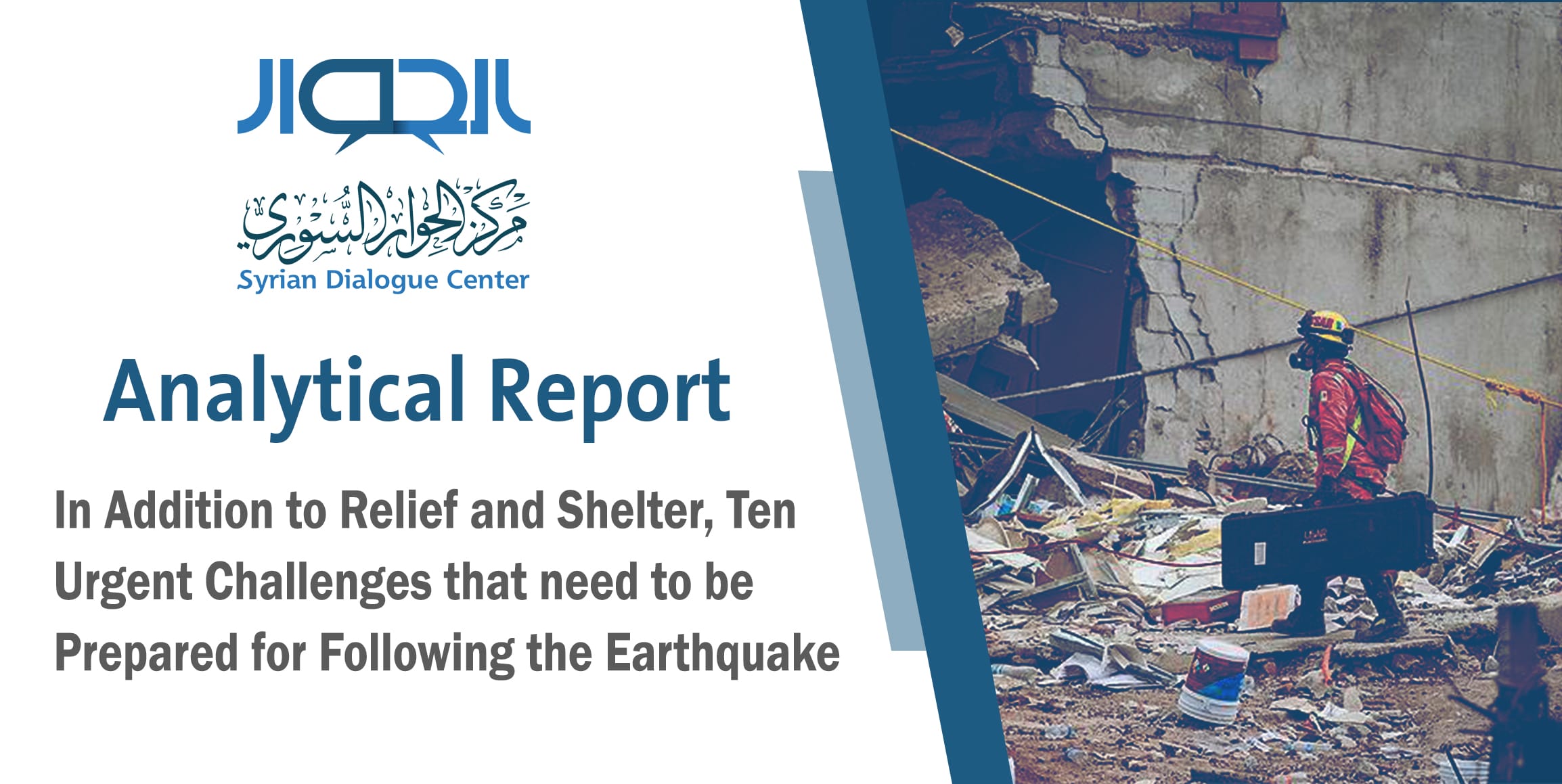
In Addition to Relief and Shelter, Ten Urgent Challenges that need to be Prepared for Following the Earthquake – Lessons Learned from the 2010 Haiti Earthquake
An analytical report issued by the Community Unit at the Syrian Dialogue Centre
Executive Summary:
On February 6th, a powerful earthquake struck vast regions in southern Turkey and northern Syria, resulting in extensive devastation and increasing humanitarian losses by the day. The Turkish government responded promptly to the earthquake, announcing an emergency plan to address the humanitarian crisis and assist affected individuals. This response drew upon prior experience and various public enterprises. However, the humanitarian response in Syria differed significantly, whether in areas controlled by the regime or the opposition, as there was no clear disaster management plan in place.
Apart from the casualties, the earthquake resulted in massive material losses, with many Syrians losing their homes under the debris, forcing them to seek refuge in streets and farms. Organizations initiated the construction of collective shelters to accommodate the initial wave of displaced individuals.
UN aid did not reach northern Syria until the fourth day following the earthquake, leaving local groups to face the disaster alone, which contributed to increased fatalities and losses. The UN cited logistical constraints as the reason for the delay in their response, while, simultaneously, 24 countries sent humanitarian aid to regime-controlled territories without delay.
International media and political attention primarily focused on Turkey and regime-controlled territories. The regime employed “disaster diplomacy” strategies to leverage the earthquake for its interests and normalize relationships with various countries. Although some Arab groups provided assistance in northern Syria, the aid contributed by Syrians themselves far exceeded that from foreign countries.
To anticipate future challenges and prepare for them, it was imperative to examine similar cases and understand the issues that emerged subsequently and how they were addressed.
Haiti Earthquake (Case Study):
In 2010, Haiti, a densely populated country in the Caribbean, experienced a devastating earthquake that claimed the lives of over 220,000 people. Haiti was grappling with poverty, weak infrastructure, and governmental corruption, magnifying the impact of the earthquake.
The UN had an existing presence in Haiti before the earthquake, and they dispatched teams within 24 hours. Aid arrived promptly, and there was cooperation among rescue teams to coordinate efforts. However, the enormity of debris, weak governance, and security challenges hindered aid and rescue operations. Limited transportation, inadequate infrastructure, communication difficulties, and aftershocks further complicated matters.
Humanitarian conditions in Haiti deteriorated one year after the earthquake, with tropical storms, the spread of cholera, and a scarcity of clean water. The uncoordinated response exacerbated these problems. Post-earthquake, there was a rapid increase in permanent injuries, disabilities, gangrene cases, sexual assaults, hunger, illnesses, and trauma.
Additionally, many children in Haiti were abducted and forced into sexual exploitation or human trafficking. Approximately 170,000 to 230,000 children were estimated to be working as domestic servants five years after the earthquake, often subjected to physical and sexual abuse.
Haiti saw little change in the first year after the earthquake, with debris still uncleared, a million people living in tents, worsening food security, rising poverty, hunger, illiteracy, crime, and sexual assault rates, and a weakened government that put pressure on natural resources and vegetation.
Experts began studying the Haiti earthquake as a case study to derive lessons from it. They found that the earthquake exposed weaknesses in the institutional capabilities of the international community. It highlighted the need for building new skills to handle emergencies before disasters strike, establishing a conceptual framework, organizational positions, and strategic visions within international institutions, alongside suitable organizational structures, in anticipation of bolstering the capabilities of local organizations and groups.
The Haiti earthquake underscored the necessity of developing strong local leadership capable of responding to emergencies and improving, coordinating, and standardizing efforts. It emphasized the importance of utilizing technology effectively in humanitarian response operations and implementing economic programs to support local communities in sustaining themselves.
Recommendations:
The situation in the aftermath of the Haiti earthquake bears similarities to the events of February 6th, especially in northern Syria, where regions under opposition control grapple with instability, exhaustion, and soaring poverty and trauma rates in recent years. The region also suffers from a multiplicity of authorities, a lack of strategy, and inadequate construction controls and standards. Furthermore, the delay in international aid and humanitarian organization response has exacerbated losses following the earthquake.
Humanitarian organizations should address the challenges of housing and immediate response while proactively preparing for anticipated needs. Overreliance on external aid should be minimized, as it is often delayed and does not cover all necessities. These organizations should allocate aid strategically to sectors that promote sustainability, rapid societal recovery, and infrastructure rebuilding.
Managing disasters of this nature necessitates cooperation among political bodies, local councils, and even de facto authorities to establish a civil defense, emergency, and disaster management authority. This authority should be prepared to address the ten expected challenges following an earthquake, which include:
- Debris management.
- Prioritizing water and sanitation programs.
- Managing and supervising construction and housing projects.
- Activating oversight roles of the Free Engineers Syndicate.
- Providing psychological support.
- Emphasizing security control and supporting local teams and authorities.
- Protecting vulnerable and marginalized groups.
- Supporting the agricultural sector.
- Leveraging technology effectively.
- Advocating for the development of local response systems.
مؤسسة بحثية سورية تسعى إلى الإسهام في بناء الرؤى والمعارف بما يساعد السوريين على إنضاج حلول عملية لمواجهة التحديات الوطنية المشتركة وتحقيق التنمية المستدامة





